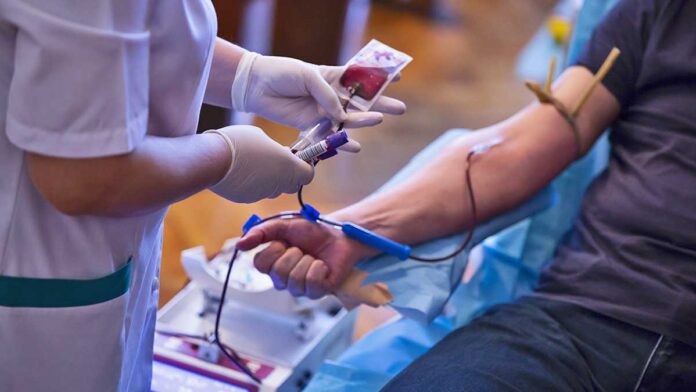The U.S. Food and Drug Administration (FDA) announced on Jan. 27 a proposal to amend its recommendations for evaluating blood donations for men who have sex with men (MSM) and other demographics who are allegedly at higher risk of contracting HIV. If adopted, the new recommendations would gauge blood donor eligibility using individual risk-based questions rather than requiring MSM to abstain from sex for three months prior to donating blood.
ADM Rachel Levine, Assistant Secretary of Health for the Department of Health and Human Services (HHS), said on Twitter, “I commend the FDA for proposing a shift to a gender-inclusive, individual risk assessment for blood donations. This positive change treats everyone the same, regardless of gender and sexual orientation. Once finalized, this policy will help ensure a steady and safe supply of blood to save lives by asking everyone the same risk-based questions.”
The proposed guidelines would entail omitting time-based deferrals for MSM and women who have sex with MSM; revising the current donor history questionnaire to ask potential blood donors about their sexual history in the past three months; prospective donors who say they have a new sexual partner or multiple sexual partners in the past three months would be asked about their history of anal sex in the same time frame; prospective donors who fit into the previous categories and had anal sex in the past three months would be deferred from donation; potential donors who say they have not had new or multiple sexual partners or had anal sex in the past three months may qualified as long as they meet the rest of the criteria.
“The Philadelphia Department of Public Health enthusiastically supports the FDA’s recommendations for evaluating donor eligibility using individual risk-based questions,” Philadelphia Department of Public Health Commissioner Dr. Cheryl Bettigole said in an email. “The proposed guidelines are more inclusive, less stigmatizing, and are based on science. The end result will be a significant expansion of the pool of potential blood donors without risk to the blood supply. Donating blood is potentially lifesaving and we are encouraged that more eligible Philadelphians can give blood.”
FDA officials are also considering maintaining the donor deferral time periods for other groups deemed at risk of HIV exposure, such as people who have done sex work, exchanged sex for drugs or have a history of using nonprescription injection drugs. Potential donors who have ever had a positive HIV test or who have taken HIV medications would still be deferred indefinitely. Staffers of blood collection establishments would still be required to test all blood donations for evidence of infections that can be transmitted via infusion, such as HIV and hepatitis B and C.
Proposed guidance concerning those who take oral HIV prevention meds is also on the table, including implementing a deferral period for potential donors who take PrEP or PEP for three months from their most recent dose. Intended donors who take injectable PrEP to prevent HIV would face a two-year deferral starting from their most recent injection.
The Washington Post story “What new questions will I be asked when I donate blood?” explains the science behind why the FDA would not permit people who are on PrEP to donate blood. Benjamin Brooks, associate director of policy and education at the D.C.-based LGBTQ health organization Whitman-Walker, told the Post that the existence of PrEP in a blood donation lowers the ability of the HIV screen to identify HIV in the sample.
“It’s not that being on PrEP means you might have HIV, it’s that being on PrEP means the screen can’t reliably find HIV in the sample,” Brooks said.
In the press release, FDA representatives acknowledged that even though the proposed recommendations have the potential to raise the number of people eligible to donate blood, some people will still face deferrals. People who take PrEP and other HIV prevention meds should not discontinue use in order to donate blood, the release says.
While some health professionals laud the FDA’s proposed guidelines, others have pointed out that there’s more to be done in terms of facilitating donations from people living with HIV or who may have been exposed to HIV.
“The FDA actions are long-overdue and a much-welcomed correction to a discriminatory and unscientific policy, especially in light of recent supply and demand constraints on blood transfusions,” Nackea Bachman, lead physician assistant at Bebashi Transition to Hope, said in an email. “While these updates are a step in the right direction, we look forward to further research into expanding access to donations from groups that remain excluded by the policy as the science and data evolve on topics such as the safety of donation for those on antiretroviral drugs.”For some potential blood donors, the FDA’s proposed guidelines are still problematic.
“What will government agencies do with the demographic information they collect when rejecting blood with HIV virus,” José de Marco, founder of Black and Latinx Community Control of Health, said in an email. “There should have always been a uniform policy that does not discriminate against blood donation.”
The proposed recommendations are derived from FDA review of data from a variety of sources including countries with similar HIV epidemiology that employ a parallel approach based on individual risk and gender inclusivity for assessing blood donor eligibility, like the U.K. and Canada. FDA officials also examined data from surveillance information from the Transfusion Transmissible Infections Monitoring System as well as the performance characteristics of nucleic acid testing for HIV.
The proposal will be open for comments from the public for 60 days, after which the FDA will take comments into consideration before establishing final guidelines. U.S. blood collection facilities will execute the new guidelines by administering a revised questionnaire to potential donors.
